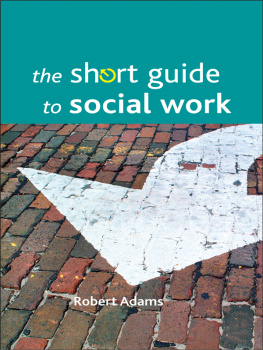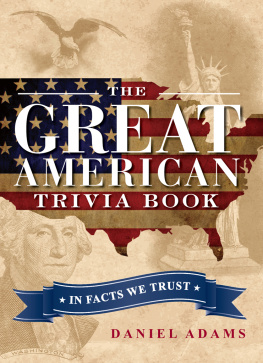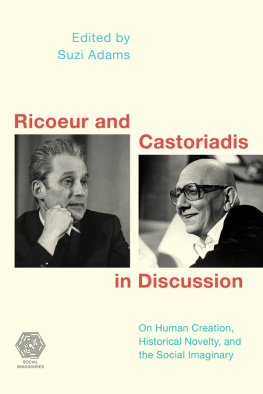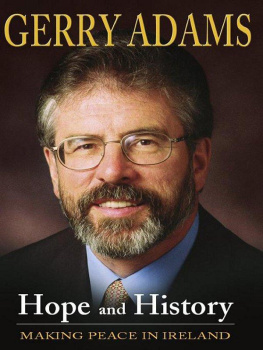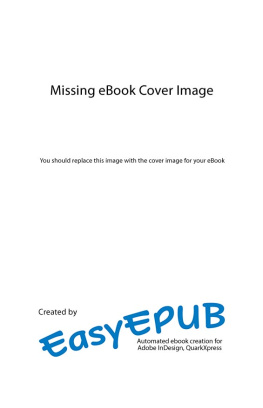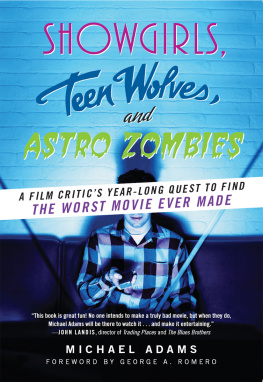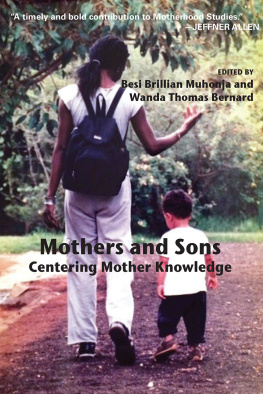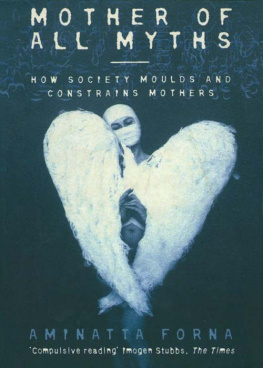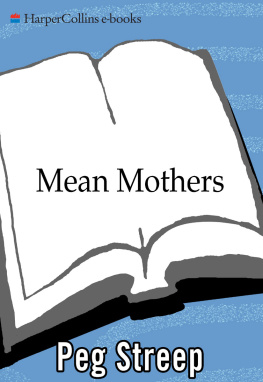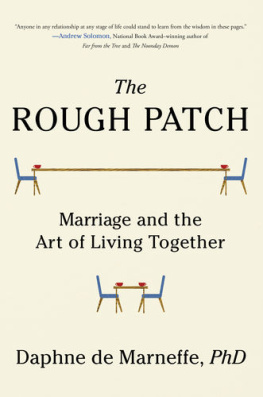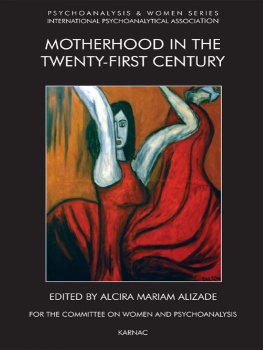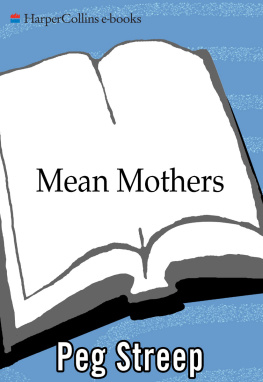MAD MOTHERS, BAD MOTHERS, & WHAT A GOOD MOTHER WOULD DO
MAD MOTHERS, BAD MOTHERS, & WHAT A GOOD MOTHER WOULD DO
The Ethics of Ambivalence
SARAH LaCHANCE ADAMS
Columbia University Press
New York

Columbia University Press
Publishers Since 1893
New York Chichester, West Sussex
cup.columbia.edu
Copyright 2014 Columbia University Press
All rights reserved
Library of Congress Cataloging-in-Publication Data
LaChance Adams, Sarah.
Mad mothers, bad mothers, and what a good mother would do: the ethics of ambivalence / Sarah LaChance Adams.
pages cm
Includes bibliographical references and index.
ISBN 978-0-231-16674-4 (cloth: alk. paper)ISBN 978-0-231-16675-1 (pbk.: alk. paper)ISBN 978-0-231-53722-3 (e-book)
1. MothersConduct of life. 2. Ambivalence. I. Title.
BJ1610.L1455 2014
306.874'3dc23
2013035268
A Columbia University Press E-book.
CUP would be pleased to hear about your reading experience with this e-book at .
Jacket Design: Jordan Wannemacher
Jacket Image: Shutterstock
References to Web sites (URLs) were accurate at the time of writing. Neither the author nor Columbia University Press is responsible for URLs that may have expired or changed since the manuscript was prepared.
For Geneva Louise LaChance Adams & Nancy Bird LaChance
Longing for the further, the higher, the brighter.
I want heirs, so saith everything that suffereth,
I want children, I do not want myself.
NIETZSCHE, THUS SPAKE ZARATHUSTRA
A Rain-Brain in a Broom-Room
Write another one, Mum, she says,
and wriggles her pants to her waist,
and pulls me down to a Henry-hug,
and squinches her soft-nosed face.
Seeing me raise the pen again,
she clasps tiny fingers in delight
and turns up the ends of her rose-bud mouth
and bounces her pudgy knees tight.
Earlier with her miniture tool,
Shed set out to sweep up her room,
Needing the dust pan in the back hall asked,
Why dont you use your broom?
Im hoping that someday shell fully comprehend,
that Ill no longer have to explain,
when using my broom I dont get the smiles
that I get when Im using my brain!
NANCY BIRD LACHANCE, 1979
For Simone de Beauvoir, the realization of freedom is to exceed who one is and who one has been through engaging in projects that change the future in a direction she values. Yet the exercise of freedom is not just the glorious, uninhibited expression of free will. In taking action one is faced with disruptive questions about the boundaries between oneself and others and the implications of ones actions for them. Making use of ones freedom entangles one in the lives of others. Having a child and writing a book are two activities that make this starkly apparent. Doing both at the same time can instill in one enough gratitude to last a lifetime. One cannot do these things alone, but requires comrades, caregivers, collaborators, worthy rivals, people to stand guard over ones solitude and to knock on the door when it is time for a break. My chief hope is that they find the finished product to be worthy of their sacrifices.
Id like to thank those who funded my dissertation work, conference travel to discuss this work, and the book project: Mount Holyoke College Alumnae Association for the Mary E. Wooley Fellowship; the University of Wisconsin, Superior for a Faculty Development Grant; the Oregon Humanities Center; the Center for the Study of Women in Society; as well as the following fellowships administered by the University of Oregon Graduate School: the Charles A. Reed Fellowship, the John L. and Naomi M. Luvaas, and Betty Foster McCue fellowships.
I wish to acknowledge my faculty mentors at the University of Oregon, especially Mark Johnson, John Lysaker, Bonnie Mann, and Beata Stawarska.
Fellow graduate students who were integral to my intellectual development and sanity include David Craig, Carolyn Culbertson, Caroline Lundquist, Jos Mendoza, Lucy Schultz, and Jessica Sims.
Further thanks are owed to my long-distance teachers and advisers: Ted George, Lisa Guenther, Dorothea Olkowski, Brian Schroeder, Eva Simms, Gail Weiss, Talia Welsh, William Wilkerson, and Jason Wirth.
All of my colleagues in the Department of Social Inquiry at the University of Wisconsin, Superior have been incredibly supportive, especially Deb Augsberger, Janet Blair, and Joel Sipress. My gratitude also goes out to Kaelene Arvidson-Hicks and Lisa Mattsson.
Students at University of Wisconsin who have been my philosophical community and genuine interlocutors include Eric Chan Burr, Yasmina Antcliff, Erin Blood, Taylor Gambos, and Benjamin Jesberg.
Id like to thank Hattie Peterson (and Amber) for loaning me their little cottage on the lake in which to complete the final revisions.
Thank you, Scott Poupore-Haats, for helping me negotiate lifes many ambiguities.
The anonymous reviewers for Columbia University Press provided invaluable comments.
A profound debt is owed to my family; including those nearbyRobert Adams, Geneva LaChance Adams, Nancy Bird LaChance; those far awayJoan Adams, Diane LaChance, Danielle Liberty, Elizabeth Parslow, and Kristan Stringer; and those whove passed onCharles Adams Jr., William Bird Sr., Marilyn Hawkins, Geneva LaChance, Raymond LaChance Sr., and Wayne LaChance. Special thanks to my Mamacita for letting me add her poem to the book.
I feel deeply grateful to my dear compatriots in motherhood, Courtney Bates and Christa Badorek, who bravely share their own complex journeys with me.
Beauvoir writes of the child drawing: By himself, he would not have dared to put confidence in those hesitant lines. These are the words that most aptly describe how I feel about your contributions to this work. Thank you.
Woman seems to differ from man in her greater tenderness and less selfishness. Woman, owing to her maternal instincts, displays these qualities toward her infants in an eminent degree; therefore it is likely that she would often extend them toward her fellow creatures.
CHARLES DARWIN, THE DESCENT OF MAN, AND SELECTION IN RELATION TO SEX
Women make us poets, children make us philosophers.
MALCOLM DE CHAZAL
On April 14, 2011, just after 7:30 AM, LaShanda Armstrong deliberately drove her minivan into the Hudson River. Her four children, ten-year-old LaShaun, five-year-old Landen, two-year-old Lance, and eleven-month-old Lainaina, were with her in the van. Only LaShaun survived; he was able to roll down a window and climb out. He made his way to a nearby fire station shivering and incoherent. By the time rescuers were able to find and reach the vehicle, one hour later, the rest of the family had drowned. In a response to this incident, Cheryl Meyer, coauthor of Mothers Who Kill Their Children recently made the conservative estimate Clearly American mothers and children are in a state of emergency that calls for immediate action.
Upon hearing of such horrific incidents as that of Armstrong and her children, we must ask ourselves: how could a mother do such a thing? Maternal love and care are supposed to be a given. This is one of those rare, mutual assumptions shared by scientists and poets alike. We would prefer to think that such instances must be rare and pathological, the actions of a deeply disturbed or evil individual. We would like to believe that a mother like Armstrong has nothing in common with good mothers, that most mothers never share in the feelings and impulses that drove Armstrong to act as she did. However, as I will argue here, this is simply not the case.
Next page

